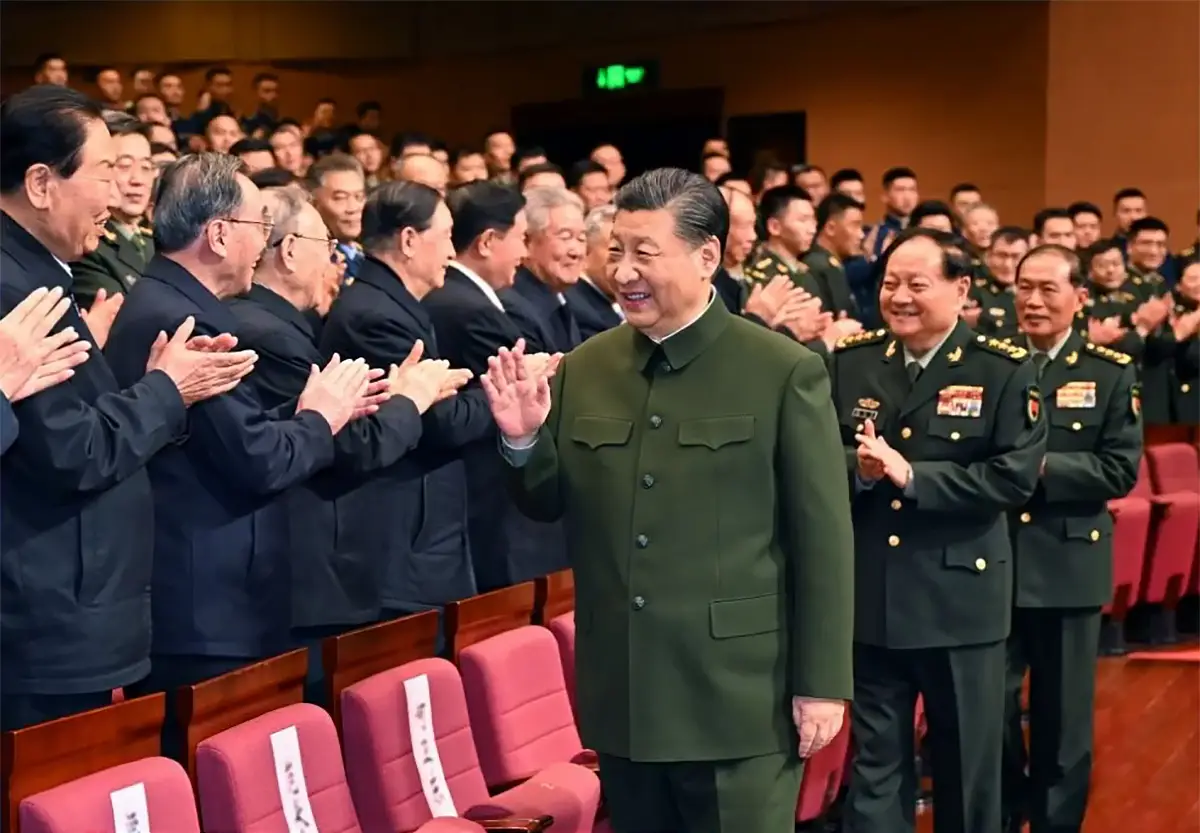House Speaker Nancy Pelosi’s recent visit to Taiwan—disregarding strident warnings from Beijing to stay away—seems to have triggered fear among Americans that war with China might be just around the corner. If the emails I have received from family and friends around the country are representative, people are having a hard time understanding how a visit by the Speaker of the House of Representatives to the small, thriving island democracy of Taiwan could generate such violent rhetoric and aggressive shows of force by Beijing. Why would the United States wind up in a war with China over Taiwan? Does the U.S. have a defense obligation to Taiwan?
Why does China care so much about Taiwan?
In 1949 the Chinese Civil War essentially ended when the Chinese Communist Party of Mao forced the Republic of China led by America’s World War II ally Chiang Kai-shek and his Nationalist Party to flee to the offshore Chinese province of Taiwan, where Chiang established what was essentially a military dictatorship. Since that time, Taiwan has evolved into a thriving democracy while Beijing has considered Taiwan to be a wayward province that must eventually be reunited with the “motherland.”
In 1950 North Korea invaded South Korea, when it appeared that UN forces led by General Douglas Mac Arthur would totally defeat North Korea, Mao’s Chinese Communist Party army intervened and forced two more years of a bloody war that forced UN forces to agree to the standoff that exists today. Washington feared that Taiwan might be the next victim of Chinese Communist aggression, and by 1955 had signed a defense treaty with the Republic of China (ROC).
In the United Nations, Washington led a successful attempt to keep Mao’s People's Republic of China (PRC) out, and for the next 22 years, the Republic of China in Taiwan remained the official representative of all of China. This changed on October 25, 1971, the UN voted to “recognize the PRC as the only legitimate representative of China to the United Nations” and removed “ the representative of Chiang Kai-shek” from the UN.
In turn, this triggered a torrent of shifts of recognition of China from Taipei to Beijing by many countries. Washington broke official diplomatic relations with the ROC on January 1, 1979, declaring that the United States of America recognizes the Government of the People's Republic of China as the sole legal Government of China. The Carter Administration also simultaneously terminated official diplomatic relations with the government in Taiwan and abrogated its defense treaty.
Since then, the U.S. has had no official diplomatic relations with the government in Taiwan.
The Carter Administration also announced America’s “one China Policy.” A careful reading of this policy indicates Washington agrees there is one China, and its government is the PRC. But the USG merely acknowledges Beijing’s claim that Taiwan is part of China and does not necessarily share the PRC assertion that China includes Taiwan. Implicitly the U.S. is saying the ultimate status of Taiwan needs to be peacefully worked out by the two parties, until then as far as Washington is concerned it is unresolved.
Both President Biden and Speaker Pelosi have reassured Beijing that the U.S. is not backing away from its “One China” policy. But Beijing has been unhappy about Washington’s “unofficial” diplomatic relationship with Taipei for many years. They have been particularly outspoken over the past six years, claiming it has been anything but “unofficial. ” In their eyes, the Pelosi visit was just the latest and most egregious example of a “salami slicing” policy approach, that will ultimately result in U.S. recognition of Taiwan as an independent state. Beijing has pledged to go to war to prevent the emergence of an independent Taiwanese state.
Is the United States required to defend Taiwan if China attacks?
The short answer is no. There is nothing automatic in U.S. law that requires the U.S. military to start shooting at the Chinese military if it attacks Taiwan. Washington’s legal defense commitments are encoded in the 1979 Taiwan Relations Act. They include the following:
- The U.S. will consider any effort to determine the future of Taiwan by other than peaceful means, which includes boycotts or embargoes, a threat to the peace and security of the Western Pacific area and of grave concern to the United States
- The U.S. will provide Taiwan with defensive arms (Which Beijing strongly opposes.)
- The U.S. will maintain the capacity to resist any resort to force or other forms of coercion that would jeopardize the security, or the social or economic system, of the people of Taiwan.
That said, it is widely assumed in Washington, Beijing and Taipei that the United States would intervene to defend Taiwan in response to an act of military aggression. But there is no American guarantee that this would happen. It would take a political decision, one that recognized the U.S. was embarking on a conflict with a well-armed, nuclear-weapons state. Still, prudent military strategists in both China’s military and the U.S. Department of Defense, shape their military plans and force structure on the assumption that war could happen and could escalate dangerously.
Could China take Taiwan by force?
For many years, Beijing could only fume at what they considered American perfidy. They lacked the ability to militarily seize Taiwan, much less cope with the prospect of U.S. military intervention. This is changing rapidly. Thanks to a burgeoning economy, Beijing has been systematically modernizing and reorganizing its military services to be able to seize Taiwan while simultaneously keeping the U.S. military at bay. In testimony before Congress, U.S. security officials and military commanders have indicated that in approximately five years, the PRC’s People’s Liberation Army (PLA) will have the requisite military capabilities to make a credible effort to militarily occupy Taiwan.
The PRC already has the ability to use hundreds of short-range, conventionally armed ballistic missiles and its powerful air force to bombard Taiwan. This was clearly on display in the wake of the Pelosi visit, when the People’s Liberation Army conducted several days of unprecedented exercises: in reality demonstrations of PLA capabilities, around the island. As the Chinese might put it, this illustrated that the PRC is not a “paper tiger” when it comes to the ability to severely damage Taiwan. Images from Ukraine provide a vivid example of what that would look like.
Is peaceful unification of China and Taiwan possible?
Not at the moment. Beijing has long claimed its goal is peaceful unification. Perversely, however, Beijing seems to be doing its best to convince the people of Taiwan the last thing they want to do is to become part of communist China. The Taiwanese have observed Xi Jinping’s actions on the mainland, rolling back the comparatively open—as long as you did not openly criticize the party—civic environment that existed a decade ago while inserting the party into virtually every aspect of Chinese civil and economic life. In Hong Kong, they have watched Beijing brush aside guarantees of 50 years of political autonomy. This was particularly telling since the “one country, two political systems” framework that facilitated Hong Kong’s reversion to the PRC is the same template for unification that Beijing is offering Taiwan.
Can the status quo between China and Taiwan endure?
The economically prosperous PRC and equally prosperous Taiwan trade with one another and share many cultural and societal links. For the most part, they have long demonstrated the ability to live side by side peacefully. Despite this, Xi Jinping has asserted that this status quo is unsatisfactory. It must be changed—by force, if necessary. Xi has his finger on the trigger of the gun pointed at Taipei and wants the political leadership of Taiwan to figuratively “come out with their hands up.”
Alas, a “live and let live” scenario across the Taiwan Strait is a pipe dream, at least for the moment. The good news is that President Xi currently has his hands full dealing with an economic downturn and long-term issues associated with his ambitious vision of the PRC’s future. It appears that the last thing he needs is a nasty, destructive war that could involve him with the United States and its friends and allies around the world.
Meanwhile, Washington should do what it can to reduce tensions. Inflaming PRC nationalism with deliberately provocative actions that seem intended to embarrass Beijing is not a sensible policy, especially since the totality of the PRC’s military power is in East Asia while only a small percentage of U.S. power is stationed there.



